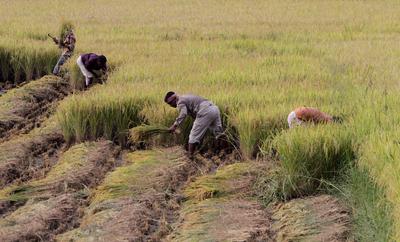Adding to this uncertainty, there are several different versions of the FSB circulating throughout the different government agencies, proposing to cover India’s rural and urban populations to varying degrees. By taking the draft version on the Department of Food and Public Distribution’s website — which proposes coverage to 75 per cent of India’s rural population and 50 per cent of its urban population — the FSB’s fiscal viability and overall cost can be estimated in the following manner.
First, the FSB will provide subsidised food grains, with a limit of seven kilograms per person per month, to 75 per cent of the rural population. At least 46 per cent of this will go to priority rural households.
Second, subsidised food grains of three kilograms per person per month will go to 50 per cent of India’s urban population, with at least 28 per cent going to priority urban households. Both of these subsidies will occur at a known fixed price.
Third, the FSB must budget for the storage of additional food, an estimated food-grain leakage of 36 per cent, the provision of free meals during pregnancy and six months thereafter to nursing women, and an additional monthly maternity benefit of Rs1000. Providing nutritional food to children aged between six months and six years, and providing midday meals to lower- and upper-primary school classes are also additional costs. And finally, the cost of transporting food grains to different ration shops must not be discounted.
Together, the total outlay for the FSB will likely amount to Rs143,000 crore (US$29 billion) — more than double the budgeted food-subsidy estimates for the current fiscal year. This huge expenditure could well make India’s fiscal recovery impossible, with current trends in government revenue and expenditure showing that while revenue growth has significantly weakened, expenditure growth has accelerated sharply.
The fiscal stress India currently faces is worryingly similar to, if not worse than, the economic climate of the 1980s, which eventually led to the 1991 crisis. For example, India’s fiscal deficit increased at an annual average of 30 per cent during the last five years as compared to 18 per cent for the decade ending in 1991. Clearly, India must commit to some very strong and urgent measures to avert a fiscal crisis. And in this context, the fiscal sustainability of the FSB is seriously in doubt.
Still, some observers claim it is churlish to argue against funding such a cause, when the Indian government regularly forgoes huge amounts of revenue.
First, revenue forgone for India’s excise-duty concession was Rs198,291 crore (US$40.4 billion) for the year 2010–11. This includes revenue forgone for mass consumption goods. But exacting the excise duty from many of these items would have worsened the fate of the poor.
Second, India’s customs-duty concessions forwent Rs174,418 crore (US$35.5 billion). It is important to note that import duties on components used for exports are universally exempt, as taxes are not supposed to be exported. Moreover, in removing these import-duty concessions, India could lose a significant part of its total export revenue.
Third, personal income tax concessions ceded Rs50,658 crore (US$10.3 billion), primarily relating to exemption limits for income tax assessments. This includes insurance premiums, contributions to charities and political parties, and interest payments on loans for higher education. While this could arguably be eliminated, will India be prepared for the distress it would cause to its salaried class?
Finally, revenue forgone for tax concessions totalled Rs88,623 crore (US$18 billion). These concessions primarily related to export undertakings established in India’s special economic zones (SEZs) and other export-oriented units. But studies show that SEZs have significant positive impacts on foreign exchange earnings, employment generation and, therefore, poverty reduction. So the net cost-benefit impact of SEZs is highly positive.
Given the details of the revenue forgone by the government, one could argue that the additional expenditure for implementing the FSB will be far greater than any actual forgone revenue, as this has largely been used to promote economic activity in the country.
So where does India go from here? It will be important to improve and expand the country’s tax base immediately. India’s tax revenue as a percentage of GDP is much lower than in neighbouring countries. India also needs to drastically improve its food-delivery mechanisms to plug existing leakages — vital to implementing any food-security bill. A significant portion of food grains, which are meant for eligible families under the public distribution system, are instead diverted to the open market. Involving local self-governments (gram panchayats) and community institutions in the running of fair-price shops could be an effective delivery mechanism to plug these leakages. Other mechanisms like cash transfers and food stamps could also be successfully replicated in India.
Ultimately though, food security will only be ensured when Indian agriculture is modernised. It will be far more effective and sustainable to allocate additional public resources to developing agriculture and infrastructure, and to delivering new technologies. This will more effectively ensure food security in India than the proposed FSB.
Dr Rajiv Kumar is Secretary-General at the Federation of Indian Chambers of Commerce and Industry.
Soumya Kanti Ghosh is Director of Economics and Research at the Federation of Indian Chamber of Commerce and Industry. The authors would like to thank Nibedita Saha for research.
This is an abridged version of two articles which were first published here and here in The Indian Express.


Most of this money will go to corrupt officials.There is nothing wrong with the food security bill, if we ensure that it goes to the right people. Socialism never works in the longer run. Government should develop infrastructure, promote growth; jobs, and increase the literacy rate.